名利场讽刺手法分析
《名利场》的现实意义探析

《名利场》的现实意义探析摘要:《名利场》是19世纪英国著名批判现实主义作家萨克雷的成名作也是代表作。
这部伟大的批判现实主义作品具有着极其鲜明的艺术特色。
作品中主要是以讽刺、幽默以及旁白等等此类叙事手法来陈述故事。
作品通过活泼愉快且生动有趣的对话来刻画人物,采用了批判现实主义表现手法揭露了当时的英国上流社会那种尔虞我诈奢侈糜烂的生活丑态,使得作品本身充满了独特的现实意义和艺术魅力。
关键词:名利场现实意义幽默讽刺一、《名利场》之作品简介《名利场》是英国伟大的著名幽默大师和批判现实主义作家萨克雷的成名作以及代表作。
在这部作品中,主要描写了女主人公利蓓的故事。
女主人公利蓓出身于家徒四壁的贫穷画诗之家,从小就父母双亡,在平克顿女子学校求学时受尽老师和同学的歧视和排挤。
在利蓓离开了学校之后,她凭借着自己的出色外貌以及聪慧机智,不择手段地获取金钱与权势,力争挤入上层社会,她甚至不惜利用自己的色相去勾引巴结权贵。
然而,天不遂人愿,尽管利蓓一心挤入上流社会,尽管她也付出了很多,她最终还是一无所有,在英国上流社会名利场之中始终是个默默无闻的小角色。
《名利场》这部作品揭露了所谓“上流社会”所谓“名利场”的肮脏和糜烂,可以说是辛辣非常、一针见血。
并且,这部作品在人物刻画和心理描写、细节描写方面都十分之出色,可以说是一部批判现实主义的佳作佳作。
二、《名利场》之手法简介现实批判主义是一种联系现实的很接地气的艺术表现手法。
在《名利场》这部小说中运用最多的叙事手法就是讽刺和幽默。
《名利场》这部小说在人物塑造这一点上尤其突出地体现了其所想要表现出的现实意义。
首先,在这部小说中很大一部分的人物的原型都是来自于作者萨克雷在现实生活中所真正认识的人。
这就使得小说中的人物塑造十分鲜活饱满,极具生活气息。
另外,人物性格的多面性、饱满型和复杂性也为小说更增添了一分现实色彩。
有些小说中的人物塑造的趋于完美,尤其是那些所谓的校园文学和言情小说更是如此。
《傲慢与偏见》和《名利场》中讽刺手法之对比

摘要:19世纪英国的两位杰出小说家奥斯汀和萨克雷都以其特色鲜明的讽刺手法而见长。
《傲慢与偏见》和《名利场》正是他们的代表作。
本文从小说的情节结构,人物塑造这两方面分析这两部小说在讽刺手法运用上的异同之处。
关键词:讽刺;情节结构;人物塑造在十九世纪英国的现实主义小说《傲慢与偏见》和《名利场》这两部小说中,讽刺手法的运用是极其重要的特色。
《傲慢与偏见》是简·奥斯汀成功地运用反讽的典范,而《名利场》则是萨克雷这位被夏洛蒂·勃朗特称为“一位犀利而无情的讽刺家”[1]的代表作,这两部作品的讽刺的手法的运用虽有相似之处,但也有各自的风格。
本文将从两部小说的情节结构,人物塑造这两方面来对此进行分析比较。
一、小说情节结构中的讽刺1.在《傲慢与偏见》中作者对小说的表现手法是作者隐于作品的背后,不直接告诉读者人物如何,而是让小说中的人物直接充当自己的代言人,将自己的一切本性直接暴露无遗而在《名利场》中,则与这种轻松幽默的喜剧色彩的讽刺不同,在《名利场》中作者是一个叙述者,往往在情节发展过程中一再中断,或者接过人物的话头进行评论,或者多对小说中人物的言行进行抨击,或者发表自己的感慨,以此表达自己的观点,引导读者的思维跟着自己走,而不是让读者自己去从情节发展结构组织中去自己体会。
2.在全书的情节组织上,《傲慢与偏见》中开头的一句话是“凡是有财产的单身汉,必定需要娶位太太,这已成为一条举世公认的真理了”,这句话奠定了整个小说的主线,即围绕男女婚姻展开叙述。
让读者有了一个初步的印象,即是有钱的单身汉一定要娶位太太,而在随后的,紧接着这个问题,有钱的单身汉彬格莱先生即将到来,在班纳特夫妇关于这个问题的讨论中我们可以得知这句话其实是一个完全相反的意思,一个单身的女人必须嫁给有钱的男人,这是班纳特夫人之流的人普遍认同的真理。
作者在一开篇就埋下了这样一个讽刺,让人防不胜防。
同时,埋下了一个陷阱,让读者随着作者一路讽刺班纳特夫人这个“不学无术,智力贫乏,喜怒无常”的反面角色,嘲讽她的普遍真理。
从《名利场》的叙事技巧看其对人物形象的刻画
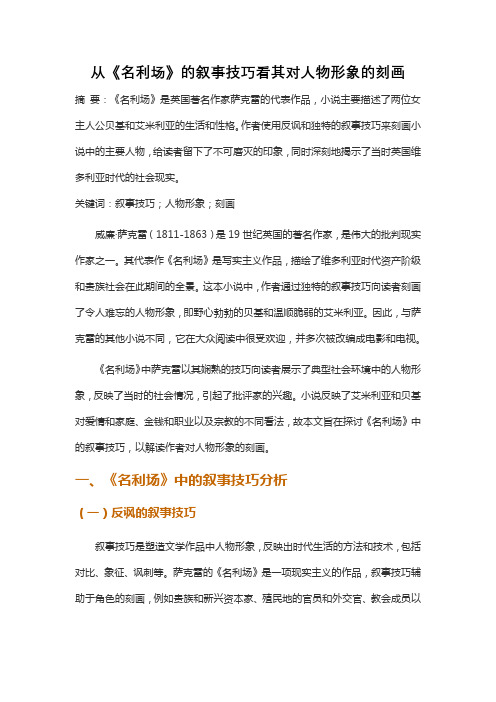
从《名利场》的叙事技巧看其对人物形象的刻画摘要:《名利场》是英国著名作家萨克雷的代表作品,小说主要描述了两位女主人公贝基和艾米利亚的生活和性格。
作者使用反讽和独特的叙事技巧来刻画小说中的主要人物,给读者留下了不可磨灭的印象,同时深刻地揭示了当时英国维多利亚时代的社会现实。
关键词:叙事技巧;人物形象;刻画威廉·萨克雷(1811-1863)是19世纪英国的著名作家,是伟大的批判现实作家之一。
其代表作《名利场》是写实主义作品,描绘了维多利亚时代资产阶级和贵族社会在此期间的全景。
这本小说中,作者通过独特的叙事技巧向读者刻画了令人难忘的人物形象,即野心勃勃的贝基和温顺脆弱的艾米利亚。
因此,与萨克雷的其他小说不同,它在大众阅读中很受欢迎,并多次被改编成电影和电视。
《名利场》中萨克雷以其娴熟的技巧向读者展示了典型社会环境中的人物形象,反映了当时的社会情况,引起了批评家的兴趣。
小说反映了艾米利亚和贝基对爱情和家庭、金钱和职业以及宗教的不同看法,故本文旨在探讨《名利场》中的叙事技巧,以解读作者对人物形象的刻画。
一、《名利场》中的叙事技巧分析(一)反讽的叙事技巧叙事技巧是塑造文学作品中人物形象,反映出时代生活的方法和技术,包括对比、象征、讽刺等。
萨克雷的《名利场》是一项现实主义的作品,叙事技巧辅助于角色的刻画,例如贵族和新兴资本家、殖民地的官员和外交官、教会成员以及女性形象。
他们的性格、社会地位和性格都是小说的亮点,共同刻画出名利场。
[1]在《名利场》中,几乎每个人都戴着面罩,具有两副面孔,有阴谋、也有诡计。
因此,萨克雷运用了全方位的叙事视角,全面地介绍了人物故事的来龙去脉,有时留下空白表述,以便读者领会。
通过小说独特的叙事分析,可以发现《名利场》中的隐藏脉络。
《名利场》的特点是讽刺和幽默。
萨克雷用反讽的语气描述了人物角色,以表达愤世嫉俗,甚至同情某些人物的追逐名望的行为。
这经常用讽刺来表现,例如,在贝基的名字之前加上“善良”二字。
萨克雷《名利场》中的现实主义.
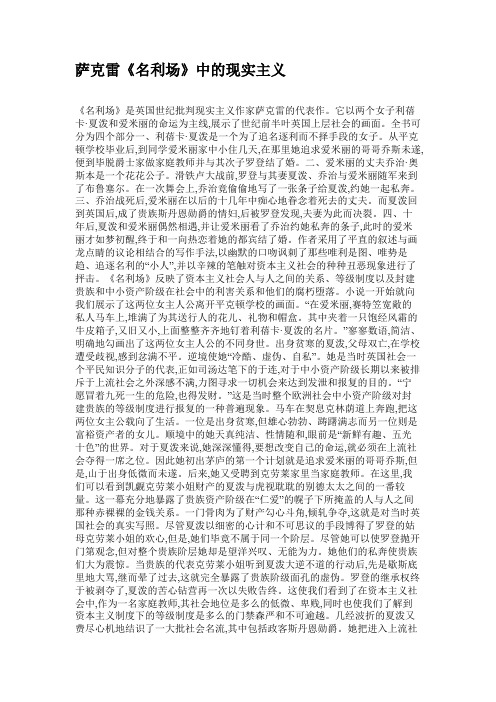
萨克雷《名利场》中的现实主义《名利场》是英国世纪批判现实主义作家萨克雷的代表作。
它以两个女子利蓓卡·夏泼和爱米丽的命运为主线,展示了世纪前半叶英国上层社会的画面。
全书可分为四个部分一、利蓓卡·夏泼是一个为了追名逐利而不择手段的女子。
从平克顿学校毕业后,到同学爱米丽家中小住几天,在那里她追求爱米丽的哥哥乔斯未遂,便到毕脱爵士家做家庭教师并与其次子罗登结了婚。
二、爱米丽的丈夫乔治·奥斯本是一个花花公子。
滑铁卢大战前,罗登与其妻夏泼、乔治与爱米丽随军来到了布鲁塞尔。
在一次舞会上,乔治竟偷偷地写了一张条子给夏泼,约她一起私奔。
三、乔治战死后,爱米丽在以后的十几年中痴心地眷念着死去的丈夫。
而夏泼回到英国后,成了贵族斯丹恩勋爵的情妇,后被罗登发现,夫妻为此而决裂。
四、十年后,夏泼和爱米丽偶然相遇,并让爱米丽看了乔治约她私奔的条子,此时的爱米丽才如梦初醒,终于和一向热恋着她的都宾结了婚。
作者采用了平直的叙述与画龙点睛的议论相结合的写作手法,以幽默的口吻讽刺了那些唯利是图、唯势是趋、追逐名利的“小人”,并以辛辣的笔触对资本主义社会的种种丑恶现象进行了抨击。
《名利场》反映了资本主义社会人与人之间的关系、等级制度以及封建贵族和中小资产阶级在社会中的利害关系和他们的腐朽堕落。
小说一开始就向我们展示了这两位女主人公离开平克顿学校的画面。
“在爱米丽,赛特笠宽敞的私人马车上,堆满了为其送行人的花儿、礼物和帽盒。
其中夹着一只饱经风霜的牛皮箱子,又旧又小,上面整整齐齐地钉着利蓓卡·夏泼的名片。
”寥寥数语,简洁、明确地勾画出了这两位女主人公的不同身世。
出身贫寒的夏泼,父母双亡,在学校遭受歧视,感到忿满不平。
逆境使她“冷酷、虚伪、自私”。
她是当时英国社会一个平民知识分子的代表,正如司汤达笔下的于连,对于中小资产阶级长期以来被排斥于上流社会之外深感不满,力图寻求一切机会来达到发泄和报复的目的。
《名利场》杨必译本赏析-精选文档

《名利场》杨必译本赏析《名利场》辛辣地讽刺了买卖良心和荣誉的“名利场”中的各种丑恶现象,是一部现实主义的杰作。
而国外优秀作品的引入往往离不开优秀的翻译,译者不仅要有高超的语言功底,还必须具备高度的文学修养、敏锐的艺术直觉以及严密的逻辑思维能力。
译界前辈杨必先生留下的《名利场》中译本准确流畅,选词精当,色调鲜明,完美地展现了原作的风格神韵,堪称译界典范。
本文将从翻译方法、措辞以及艺术风格等方面对杨必先生的《名利场》译本进行简要评析。
一、从翻译方法分析1.分句。
例1:While the present century was in its teens, and on one sunshiny morning in June, there drove up to the great iron gate of Miss Pinkerton's academy for young ladies,on Chiswick Mall, a large family coach, with two fat horses in blazing harness, driven by a fat coachman in athree-cornered hat and wig, at the rate of four miles an hour.译文:当时我们这世纪刚开始了十几年。
在六月里的一天早上,天气晴朗,契息克林荫道上平克顿女子学校的大铁门前面来了一辆宽敞的私人马车。
拉车的两匹肥马套着雪亮的马具,肥胖的车夫戴了假头发和三角帽子,赶车子的速度不过一小时四哩。
考虑中英文句型结构、语言习惯等的差异,译者需具备深厚的语言功底,通过拆分等方式,在翻译过程中进行句型句式转换,使其晓畅易懂且合乎中文句法。
杨必先生《名利场》开篇第一段很明显得采用了分句的译法,将原文的长句分成短句表达,语言朴实流畅且衔接连贯自然。
译者对原文的语序、结构等亦做了一些必要的调整,从而使译文符合中文表达方式和思维逻辑,易于读者理解。
浅析萨克雷《名利场》中的语言表达艺术

2020-10文艺生活LITERATURE LIFE浅析萨克雷《名利场》中的语言表达艺术赵继红(中国劳动关系学院,北京100048)摘要:萨克雷作为英国维多利亚时代的代表小说家,其成名作《名利场》更是以辛辣讽刺的语言风格,深刻揭露了资本主义社会下人性的虚伪、贪婪和无情,批判了当时社会唯金钱至上的观念,是一部现实主义的杰作。
小说运用生动的语言描写和讽刺手法,将主人公的性格特征展现地淋漓尽致。
基于此,本文对《名利场》的语言表达艺术进行分析和解读。
关键词:《名利场》;萨克雷;语言表达中图分类号:I106文献标识码:A文章编号:1005-5312(2020)30-0042-01DOI:10.12228/j.issn.1005-5312.2020.30.027一、引言《名利场》是英国批判现实主义作家萨克雷的代表作,其时代背景发生于十九世纪初的英国中上层社会。
当时,英国正处于维多利亚时期,工商业的发达给其经济发展带来了强劲的动力,促进了社会的进步,但同时也拉大了社会的贫富差距。
而英法两国之间关于政权的争夺之战也在此时打响。
中上层社会的人物都在忙着争权夺位,积累财富,这种风潮对人们的思想观念产生了巨大的影响,每个人都希望通过各种手段来达到自己对名利的追求。
《名利场》原作的副标题是《没有英雄的小说》,故事主要围绕在从平克顿女校毕业的两个女学生身上:一个是攻于心计出身低微的丽贝卡,一个是温柔善良出身富贵的艾米利亚。
由于家庭背景和成长环境的不同,两个女主人公的性格特征和人生发展轨迹也都截然不同。
聪明漂亮的丽贝卡出身于贫穷的画师家庭,从小父母就去世了,在社会上受尽了歧视。
为了摆脱困境,她利用种种计谋,甚至不惜以色相引诱,成功跻身于上流社会,但最终却落得众叛亲离的下场。
相较于丽贝卡,艾米利亚出身优渥,但安于现状且性格懦弱,屡次被命运所捉弄。
在这部小说中,萨克雷打破了传统的写作手法,大篇幅地运用了心理描写来刻画人物形象,继承了英国文学一贯的幽默讽刺,小人物的命运被无情地投入到这个残酷现实的名利场中,生动地描绘了资本主义制度下人性的丑恶,为读者展现了一幅19世纪英国中上层社会的全景图。
从关联理论的角度解析《名利场》中的言语讽刺
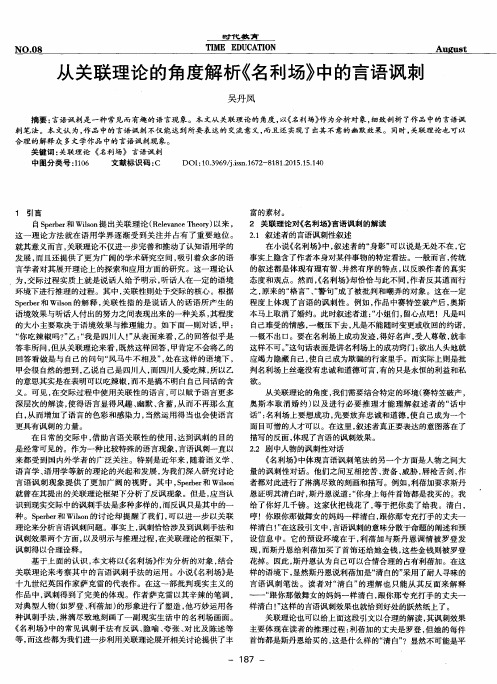
环境下进行推理 的过程 。其中 , 关联性 则处于交际 的核心ቤተ መጻሕፍቲ ባይዱ。根据
S p e r b e r 和 Wi l s o n 的解 释 , 关联 性指 的是说 话人 的话语 所产 生 的 语 境效果与听话人付 出的努力之间表现 出来 的一种关 系 , 其程度
的大小 主要 取决 于语 境效果 与推理能 力 。如下 面一则对话 , 甲: “ 你 吃辣椒 吗? ” 乙: “ 我是 四川 人 ! ” 从 表面来看 , 乙的回答似乎是 答非所问 , 但从 关联理论来看 , 既然这样 回答 , 甲肯定不会将 乙的 回答看做 是与 自己的 问句 “ 风 马牛不相及 ” , 处在 这样 的语境 下 , 甲会 很 自然 的想到 , 乙说 自己是 四川人 , 而 四川人爱 吃辣 , 所 以乙
墼 宣
No . 08
T I ME E D U C A T 1 0 N
Au g u s t
言语讽刺 日 口 I J 从关联 理论 的角度解 析《 名利场》 中的
吴 丹凤
摘要 : 言语讽刺是 一种常见 而有趣 的语言现 象。本文从 关联 理论的 角度 , 以《 名利 场》 作为分析 对象, 细致剖析 了 作 品 中的言语讽 刺 笔法 。本 文认 为 , 作 品 中的言语讽 刺不仅能达到 所要 表达 的交流意义 , 而且还 实现 了出其不意的 幽默 效果 。同时 , 关联理论也 可以
合 理的解释众 多文学作 品 中的言语讽刺现 象。 关键 词 : 关联 理论 《 名利 场》 言语讽 刺 中图分类号 : 1 1 0 6 文献标识码 : C DOI : 1 0 . 3 9 6 9 / j . i s s n . 1 6 7 2 — 8 1 8 1 . 2 0 1 5 . 1 5 . 1 4 0
论萨克雷小说《名利场》中的讽刺表现手法

贝基为了金钱名利 处心积 虑 , 费尽 心机 , 了生存不 择 为
悟 。这使得读者 由被动的看戏变为 主动参与故事情节 发展 。
手段 。她认为 自己的智慧 与美貌 远远超 过那 些贵族夫 人小 姐们 , 但她苦心经营 了一辈子 也难 真正玩转 上流社 会 , 算 就
第2 3卷第 6期 21 0 0年 1 2月
江西 金 融 职工 大学 学 报
J un lo in x ia c l g o ra fJa g iFn n eCo e e l
Vo . 3 No. 12 6 De 2 O c. 01
论萨 克 雷 小说 《 名利 场 》 的讽 刺 表现 手法 中
朱 婷
30 2 ) 30 2
( 江西师范大学 外语学 院, 江西 南 昌
摘要 : 名利场》 《 是十九世 纪英 国批判现 实主义小说 家 萨克雷的代表 作。小说 着力写出西方资产阶级上层人与 人之 间尔虞我诈 、 趋炎附势、 争权夺利 、 金钱至上的社会现 实。正是通过特定的表 现手法, 作者 引导读者 了解 “ 名利 场” 的真面 目, 小说 中呈现耐人 寻味 的讽刺效果。讽刺 艺术一直是《 在 名利 场》 的一大亮点 , 本文通过对 小说《 名利 场》 中灵活 多样的讽 刺批 判表现手 法的梳理 , 图领略作 品中精妙 的现 实主 义讽刺效果。 试
名利场是一个引诱 去朝圣 的人 们误人歧途 的小 镇。镇 上 的居 民都是 自私 冷漠 的 , 他们引诱路 人在名利场 中倾其 所 有 以得到短暂的 肉体 上的快 乐却没 有更长久 的意义 。萨克
( ) - 特殊的讽 刺叙述方式
不 同于同时代的大多数讽 刺小说 , 仅仅 以第 一视角来描 述, 批判 社会 现实。萨克雷 的作 品有着特 殊 的叙 述方式 , 所 有人物都一如开场所交 代 , 实际上 是一群 木偶 , 出演着 一 台 争名夺利的戏码。作者 自己在这 场木偶 戏 中则 以冷峻 的视 角描绘 出人们的状 态。他扮演着一个全 知的叙述者 , 对人物
名利场对社会名利与人性堕落的揭示与讽刺
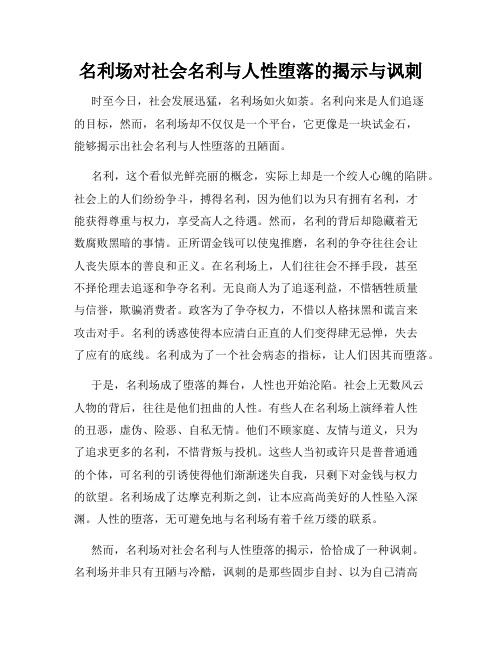
名利场对社会名利与人性堕落的揭示与讽刺时至今日,社会发展迅猛,名利场如火如荼。
名利向来是人们追逐的目标,然而,名利场却不仅仅是一个平台,它更像是一块试金石,能够揭示出社会名利与人性堕落的丑陋面。
名利,这个看似光鲜亮丽的概念,实际上却是一个绞人心魄的陷阱。
社会上的人们纷纷争斗,搏得名利,因为他们以为只有拥有名利,才能获得尊重与权力,享受高人之待遇。
然而,名利的背后却隐藏着无数腐败黑暗的事情。
正所谓金钱可以使鬼推磨,名利的争夺往往会让人丧失原本的善良和正义。
在名利场上,人们往往会不择手段,甚至不择伦理去追逐和争夺名利。
无良商人为了追逐利益,不惜牺牲质量与信誉,欺骗消费者。
政客为了争夺权力,不惜以人格抹黑和谎言来攻击对手。
名利的诱惑使得本应清白正直的人们变得肆无忌惮,失去了应有的底线。
名利成为了一个社会病态的指标,让人们因其而堕落。
于是,名利场成了堕落的舞台,人性也开始沦陷。
社会上无数风云人物的背后,往往是他们扭曲的人性。
有些人在名利场上演绎着人性的丑恶,虚伪、险恶、自私无情。
他们不顾家庭、友情与道义,只为了追求更多的名利,不惜背叛与投机。
这些人当初或许只是普普通通的个体,可名利的引诱使得他们渐渐迷失自我,只剩下对金钱与权力的欲望。
名利场成了达摩克利斯之剑,让本应高尚美好的人性坠入深渊。
人性的堕落,无可避免地与名利场有着千丝万缕的联系。
然而,名利场对社会名利与人性堕落的揭示,恰恰成了一种讽刺。
名利场并非只有丑陋与冷酷,讽刺的是那些固步自封、以为自己清高无私的人。
名利场的存在是人们竞争的舞台,它揭示了社会风气的虚伪以及人性的存在偏差。
它是一个巨大的反讽,让那些一味追求名利并且嘲笑他人的人,对照镜子看到了自己。
名利场随处可见的陷阱与荆棘,提醒人们保持警觉,不要被权力与金钱的外衣所迷惑。
它揭示了人性中本不可承认的部分,让人们反思自己所追求的东西代表了什么。
名利场对社会名利与人性堕落的揭示与讽刺,其实也给了人们一个机会,机会去重新审视自己的人生观和价值观。
《名利场》中的虚伪社会与人性
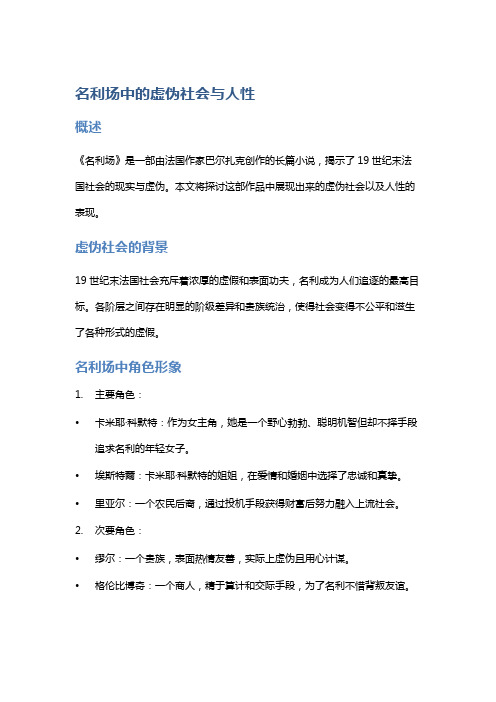
名利场中的虚伪社会与人性概述《名利场》是一部由法国作家巴尔扎克创作的长篇小说,揭示了19世纪末法国社会的现实与虚伪。
本文将探讨这部作品中展现出来的虚伪社会以及人性的表现。
虚伪社会的背景19世纪末法国社会充斥着浓厚的虚假和表面功夫,名利成为人们追逐的最高目标。
各阶层之间存在明显的阶级差异和贵族统治,使得社会变得不公平和滋生了各种形式的虚假。
名利场中角色形象1.主要角色:•卡米耶·科默特:作为女主角,她是一个野心勃勃、聪明机智但却不择手段追求名利的年轻女子。
•埃斯特爾:卡米耶·科默特的姐姐,在爱情和婚姻中选择了忠诚和真挚。
•里亚尔:一个农民后裔,通过投机手段获得财富后努力融入上流社会。
2.次要角色:•缪尔:一个贵族,表面热情友善,实际上虚伪且用心计谋。
•格伦比博奇:一个商人,精于算计和交际手段,为了名利不惜背叛友谊。
•其他社会精英和底层人物:展示了社会各个阶层的虚伪行为和追逐名利的本性。
虚伪社会中的勾心斗角1.名利场中人们经常以虚假面目互相欺骗、背叛和勾心斗角。
他们通过表面上的合作与友谊来获取自己的私利,并以虚伪的方式掩盖自己真正的动机。
2.角色之间的关系充满了权谋、算计和奸诈。
他们无所不用其极地玩弄权力、财富和欲望,以满足自己对名利的渴望。
人性在名利场中的显露1.巴尔扎克展示了名利场中人性最黑暗而丑陋的一面。
这部小说揭示了人性中贪婪、欺骗、自私、阴谋等负面特征的存在和发展。
2.尽管名利场是虚伪的,但作品中也存在着少数拥有真实情感的人物,他们在面对名利时保持了纯真和忠诚的态度。
名利场对现实社会的启示《名利场》所展现的虚伪社会与人性对我们现实社会也有一定的启示: 1. 告诉我们在追逐名利时要保持清醒和警惕,不被虚假表象所蒙蔽。
2. 提醒我们要珍惜纯真、坦诚和正直等价值观,不被功利主义主导。
结论《名利场》通过揭示19世纪末法国社会中的虚假与虚伪,深刻剖析了人性中负面特征的体现。
它向我们提示了一个道德下滑和修养缺失引起的虚伪问题。
《名利场》的反讽谫谈

《名利场》的反讽谫谈摘要:萨克雷的《名利场》是一部讽刺现实主义著作,其讽刺性在于内容和叙述者身份两方面。
内容上他讽刺名利,另外借助叙述者的多重身份,从不同视角、以不同叙述方式进行讽刺,消除一切崇高性。
作为观察者,他在对话中再现人物思想冲突,贬低双方;作为表演者,他以演员内部视角讽刺上层的虚伪、愚昧;作为评价者,他站在读者的位置批评名利场,又批判读者潜意识中的趋利性。
关键词:叙述者;身份;反讽萨克雷的《名利场》是一部反讽意味浓郁的现实主义著作,作者深邃的反讽智慧表现在两方面:内容上,萨克雷对一切世俗活动——追名逐利的活动——进行批判;形式上,叙述者——以领班形象出现——因“思”与“在”的分离而拥有多重身份,从不同视角,以不同叙述方法进行讽剌,消除一切崇高性。
一、作为观察者的叙述者《名利场》中领班大多作为外在于名利场的观察者而出现,其他人物是叙述者隐身时观看的客体,他人以其独立自主的姿态成为叙述者观察的客体,而这种观察者的隐身与客体的独立性使得人物对自身进行表述、说明,不受高高在上的叙述者思想支配,叙述者如其所是得记录名利场中的人物、事件,客观再现事件的始末。
在客观再现情况下,讽刺的可能性在于人物自身的自相矛盾,也在于不同人物之间的相互对抗。
人物自相矛盾使人物在思想、语言或行为上与自己对话,在自我对话中没有自我否认,即没有压倒性的主流观念,对等观念的前后提出固然有环境变化的缘故,但变化的中心不在于环境变化,而在于自我利益需求的改变,这种利己主义走向自相矛盾,从而实现人物对自身的讽刺。
自相矛盾、表里不一是名利场上人们的特性,如克劳莱小姐表面上对冲破世俗束缚的浪漫故事赞赏不已。
另一方面,在这个“道德沦丧”的场域里,不同的人物常常被放置在相同的情境之下,他们各自拥有自身独立的思想,在情境中冲突对抗,与他人的思想进行对话。
《名利场》叙述者的隐身与人物自身言说使得人物可以作为独立的个体进行对话。
对话中“主要主人公每一个重要行为、每一个重要思想的显示,都离不开这种‘各执一词’的对话……所有他人观察世界的角度都同他(拉斯科尔尼科夫)的角度交错在一起。
讽刺的完美体现_解读_名利场_讽刺的三条线
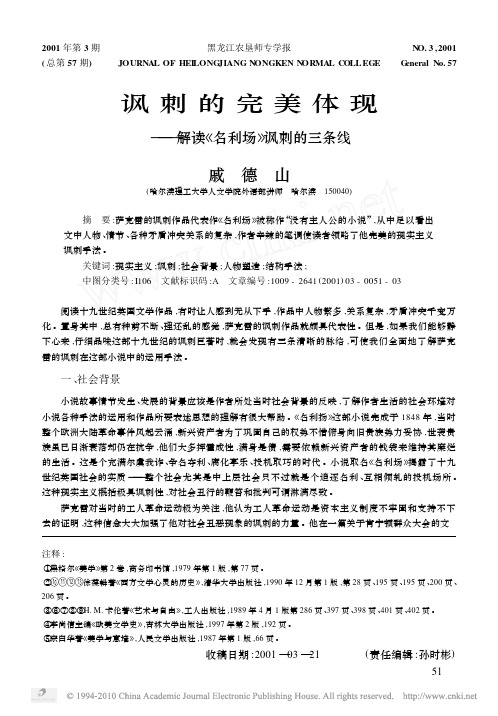
萨克雷把《名利场》的结构写得很特殊 ,他把自己小说的情节看成是木偶戏一样 ,而他本身就是木偶 喜剧的导演和解说员 ,并时不时地走到台前跟观众谈谈自己的木偶演员 ,这种方式在现实主义讽刺意图 中起着非常重要的作用 。作家摒弃了他那个时代英国文学中家庭纪事或传记小说等传统模式 。在这 里 ,问题不仅在于他想用爱米丽娅的生活经历来补充“蓓基的生活和奇遇”,或者把商业家奥斯本家的命 运和地主克劳莱家的命运相比较 ,问题在于萨克雷的小说结构是以对现象进行更高的社会概括为前提 。 它表现在英国新出现的反映人物个人命运和展开小说情节的社会环境之间的相互关系中 。其实《, 名利 场》的社会背景已不是单纯的背景 ,即多少使人相信是画出来的布景 ,它本身也在故事中起着积极作用 。 各种形形色色的而同时在本质上又都是无所作为的人物的命运 ,使读者感到在他们面前生活和活动的 并不是作者如此逼真地虚构出的狭小人物的圈子 ,而就是生活本身 。
一 、社会背景
小说故事情节发生 、发展的背景应该是作者所处当时社会背景的反映 ,了解作者生活的社会环境对 小说各种手法的运用和作品所要表述思想的理解有很大帮助 。《名利扬》这部小说完成于 1848 年 ,当时 整个欧洲大陆革命事件风起云涌 ,新兴资产者为了巩固自己的权势不惜俯身向旧贵族势力妥协 ,世袭贵 族虽已日渐衰落却仍在抗争 ,他们大多挥霍成性 ,满身是债 ,需要依赖新兴资产者的钱袋来维持其糜烂 的生活 。这是个充满尔虞我诈 、争名夺利 、腐化享乐 、投机取巧的时代 。小说取名《名利场》揭露了十九 世纪英国社会的实质 ———整个社会尤其是中上层社会只不过就是个追逐名利 、互相倾轧的投机场所 。 这种现实主义概括极具讽刺性 ,对社会丑行的鞭笞和批判可谓淋漓尽致 。
二 、人物形象塑造
《名利场》读后感

《名利场》:欲望的漩涡,灵魂的救赎
英国作家威廉·梅克比斯·萨克雷的讽刺小说《名利场》以其深刻的人性剖析和独特的艺术风格,成为文学史上的一部佳作。
这部作品以19世纪英国社会为背景,描绘了一幅名利场的众生相,让我在阅读中感受到了人性的复杂和社会的诡谲。
《名利场》的故事围绕着两位女主角贝姬·夏泼和约瑟芬·奥斯本展开,她们在社会的名利场中翻云覆雨,机关算尽。
贝姬的聪明机智、约瑟芬的美貌野心,她们为了达到目的不择手段,虚伪、欺骗、背叛,人性中的贪婪和欲望被暴露无遗。
萨克雷以锐利的笔触,揭示了这个时代的虚伪和贪婪,让我对19世纪英国社会有了更深的认识。
然而,在这个充满权谋和欺诈的世界里,我也看到了人性的另一面。
贝姬和约瑟芬在追求名利的过程中,也显露出了一定的坚韧和勇敢。
她们面对困境时的挣扎和抉择,让我看到了人性的复杂和矛盾。
这使得《名利场》不仅仅是一部揭露社会黑暗的作品,更是一部探讨人性救赎的深度之作。
萨克雷在《名利场》中以其独特的讽刺手法,展示了名利场的众生相,让人深思。
在这个欲望的漩涡中,人们迷失了自己,道德伦理被抛诸脑后。
然而,正是这种对名利的追求,使得人们不断地挣扎、上升,也使得社会不断向前发展。
这就是人性的矛盾,也是社会的复杂。
阅读《名利场》,让我对人性有了更深的理解和思考。
这部小说中的人物形象鲜明,故事情节跌宕起伏,让我在阅读中感受到了人性的挣扎和痛苦。
萨克雷以其独特的艺术风格,让我看到了人性的黑暗和社会的诡谲,也让我对人性救赎有了更深的思考。
名利场社会讽刺的尖锐之笔

名利场社会讽刺的尖锐之笔名利场社会一直是一个充满荣耀和利益的舞台,它吸引着无数人的目光和追逐,但同时也掩盖着无数丑恶和虚伪。
社会讽刺作为一种文学艺术形式,以尖锐的笔触揭示、嘲讽和批判名利场社会的种种现象,迎刃而解地展现出这个社会的真实面貌和人性的荒谬。
本文将从几个具有代表性的角度入手,深入探讨名利场社会讽刺的尖锐之笔。
一、荒诞的权力关系名利场社会充斥着各种权力和阶层的差异,这成为讽刺的主要对象之一。
浮夸的官员和无能的领导是名利场社会的现象,他们通过欺骗和利用他人来获取权力和地位,却往往缺乏真正的能力和担当。
他们虚伪地宣扬自己的英雄事迹,却忽略了基层人民的真实需求。
这种现象被讽刺家通过夸张、荒诞和嘲笑的手法,揭示出权力关系的虚伪和荒谬。
二、道德的沦丧与价值观的倒置在名利场社会中,道德价值观往往被丧失和倒置,对此进行讽刺和批判,成为艺术家们的另一重要课题。
名利场上,以德行和能力为导向的价值观往往被金钱和权力所取代,人们为了名利不惜背离原有的道德底线。
这种伪装和虚伪被讽刺家以尖锐的笔触揭示,并通过讽刺手法批判名利场社会中的道德沦丧和价值观的倒置。
三、虚假的关系与无情的竞争在名利场社会中,人与人之间的关系常常被虚假和利益所驱动。
人们往往通过谎言和表面文章来获取别人的信任和利益,这种虚伪和利己主义的关系成为社会讽刺的重要对象。
讽刺家以尖锐的笔触讽刺和揭示这种虚假的关系,并通过嘲笑和戏谑的手法,让人们看到这种关系下的人性的荒谬。
回首名利场社会讽刺的尖锐之笔,我们看到了一个真实而又荒诞的社会图景。
通过讽刺手法,我们不仅仅对名利场社会有了更深入的认识,更从讽刺的角度审视自己,思考我们在这个社会中的角色和立场。
同时,讽刺作为一种文学艺术形式,不仅仅是对现实的嘲笑和批判,更是对人性的反思和深化。
只有通过诙谐和讽刺,才能更好地唤醒人们对名利场社会的警醒和反思。
综上所述,名利场社会讽刺的尖锐之笔,以其犀利的眼光揭示和嘲笑名利场社会中的丑恶和虚伪。
《名利场》读后感

《名利场》:人性的舞台,社会的缩影
闻名遐迩的英国作家威廉·梅克比斯·萨克雷的杰作《名利场》,以其独特的讽刺笔触,揭露了19世纪英国社会的虚伪与贪婪。
我在这部小说中看到了人性的复杂,看到了社会的真实。
《名利场》的故事背景设定在19世纪英国,讲述了两位女主角贝姬·夏泼和约瑟芬·奥斯本在社会上翻云覆雨、攀附权贵的故事。
她们为了达到目的,不择手段,虚伪、欺骗、背叛,种种道德沦丧的行为在这两个人物身上得到了充分的体现。
萨克雷以尖锐的笔触,揭示了人性的丑恶和社会的黑暗。
贝姬·夏泼,这位聪明、机智、富有魅力的女性,为了挤进上流社会,不惜放弃真爱,投身于权贵之间的争斗。
她笑里藏刀,口是心非,将人性的虚伪暴露无遗。
而约瑟芬·奥斯本,则是一个虚荣、自私、浅薄的女性,她依赖自己的美貌和手段,在上流社会中游刃有余,却忘记了真正的幸福。
这两个角色,如同镜子一般,映照出了人性的贪婪和丑陋。
在这部小说中,萨克雷以其独特的讽刺手法,对19世纪英国社会的虚伪进行了无情的揭露。
他描绘了一个充满权谋、欺诈、背叛的社会,让人不禁感到惊心动魄。
在这个社会里,人们为了追求名利,不择手段,道德伦理被彻底沦丧。
萨克雷以敏锐的洞察力,揭示了这一时期英国社会的真实面貌,让人深思。
同时,《名利场》也让我看到了人性的复杂。
在这部小说中,人物性格鲜明,矛盾冲突激烈。
贝姬和约瑟芬这两个角色,一方面表现出了人性的贪婪和丑陋,另一方面,她们在追求名利的过程中,也展现出了人性的坚韧和勇敢。
这种复杂性让人感叹不已,也让我对人性有了更深的理解。
《名利场》中的道德败坏与社会伦理

名利场中的道德败坏与社会伦理简介《名利场》是一部由谢让创作的小说,描绘了一个充满权力和勾心斗角的都市生活。
本文将探讨在这个名利场中,人们身处追逐名利的竞争环境下,道德败坏和社会伦理受到的冲击。
道德败坏在《名利场》中,人们为了得到名利、地位和财富而不择手段。
道德败坏体现在以下几个方面:1.欺骗和背叛:人物之间经常进行各种形式的欺骗,例如伪造证据、编织谎言等。
同时还有朋友之间的背叛行为,为了自身利益出卖信任关系。
2.权谋和勾心斗角:人们使用各种手段来争夺权力和地位,在这个过程中不断施展政治策略、明争暗斗以及阴谋诡计。
他们甚至不惜牺牲别人的利益以满足自己的野心。
3.腐败与贪污:官员们为了满足自身的贪欲,接受贿赂、滥用职权等行为屡见不鲜。
他们将追逐名利置于道德和公正之上。
社会伦理的冲击名利场中的道德败坏不仅仅对个人造成影响,也对整个社会伦理产生了冲击:1.信任危机:由于人们背叛和欺骗的行为,社会中的信任关系逐渐瓦解。
这导致人们互相猜忌,并且难以建立持久稳固的合作关系。
2.社会动荡:名利场中充斥着各种竞争和角逐,这引发了一系列的社会动荡。
人们陷入恶性竞争中,不择手段地追求自身利益,导致社会秩序混乱。
3.价值观扭曲:在这个追逐名利的环境下,人们普遍对金钱和地位产生过度追求,而忽视了更重要的道德价值观。
这导致了整个社会价值观扭曲,道德沦丧。
对策与建设面对《名利场》中出现的道德败坏和社会伦理的冲击,我们应该采取以下对策与建设:1.培养良好教育:加强对年轻一代的教育,注重价值观培养,鼓励他们树立正确的人生观、价值观和道德观。
只有通过良好教育才能塑造出积极向上的文明社会。
2.加强法制约束:建立健全的法律体系,严厉打击各种违法行为,并实施公正的司法制度以确保每个人都受到公正待遇。
同时,要提高执法部门的监督力度,减少腐败现象。
3.倡导诚信文化:加强对社会诚信意识的培养和宣传,在名利场中弘扬诚信、守信、廉洁等优秀社会伦理价值观。
《名利场》的反讽谫谈
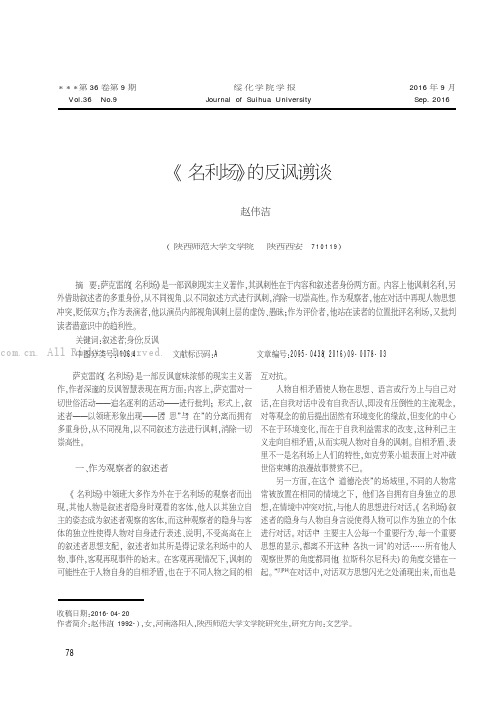
收稿日期:2016-04-20作者简介:赵伟洁(1992-),女,河南洛阳人,陕西师范大学文学院研究生,研究方向:文艺学。
《名利场》的反讽谫谈摘要:萨克雷的《名利场》是一部讽刺现实主义著作,其讽刺性在于内容和叙述者身份两方面。
内容上他讽刺名利,另外借助叙述者的多重身份,从不同视角、以不同叙述方式进行讽刺,消除一切崇高性。
作为观察者,他在对话中再现人物思想冲突,贬低双方;作为表演者,他以演员内部视角讽刺上层的虚伪、愚昧;作为评价者,他站在读者的位置批评名利场,又批判读者潜意识中的趋利性。
关键词:叙述者;身份;反讽中图分类号:I106.4文献标识码:A 文章编号:2095-0438(2016)09-0078-03(陕西师范大学文学院陕西西安710119)赵伟洁∗∗∗第36卷第9期绥化学院学报2016年9月Vol.36No.9Journal of Suihua UniversitySep.2016萨克雷的《名利场》是一部反讽意味浓郁的现实主义著作,作者深邃的反讽智慧表现在两方面:内容上,萨克雷对一切世俗活动———追名逐利的活动———进行批判;形式上,叙述者———以领班形象出现———因“思”与“在”的分离而拥有多重身份,从不同视角,以不同叙述方法进行讽剌,消除一切崇高性。
一、作为观察者的叙述者《名利场》中领班大多作为外在于名利场的观察者而出现,其他人物是叙述者隐身时观看的客体,他人以其独立自主的姿态成为叙述者观察的客体,而这种观察者的隐身与客体的独立性使得人物对自身进行表述、说明,不受高高在上的叙述者思想支配,叙述者如其所是得记录名利场中的人物、事件,客观再现事件的始末。
在客观再现情况下,讽刺的可能性在于人物自身的自相矛盾,也在于不同人物之间的相互对抗。
人物自相矛盾使人物在思想、语言或行为上与自己对话,在自我对话中没有自我否认,即没有压倒性的主流观念,对等观念的前后提出固然有环境变化的缘故,但变化的中心不在于环境变化,而在于自我利益需求的改变,这种利己主义走向自相矛盾,从而实现人物对自身的讽刺。
英国文学作品赏析——萨克雷《名利场》的叙述策略
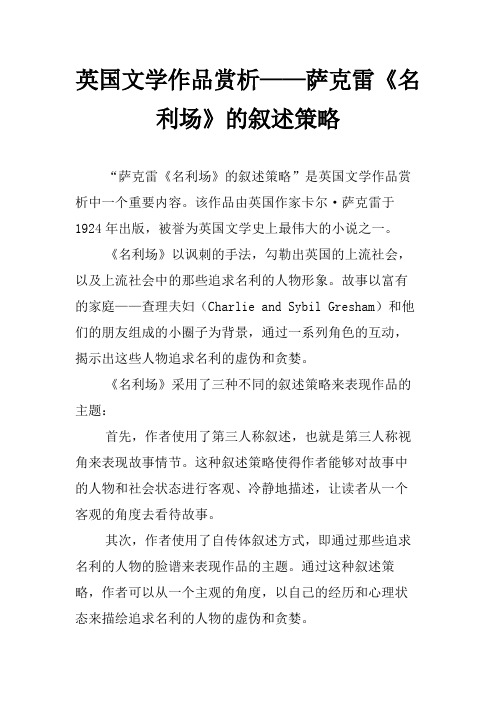
英国文学作品赏析——萨克雷《名利场》的叙述策略
“萨克雷《名利场》的叙述策略”是英国文学作品赏析中一个重要内容。
该作品由英国作家卡尔·萨克雷于1924年出版,被誉为英国文学史上最伟大的小说之一。
《名利场》以讽刺的手法,勾勒出英国的上流社会,以及上流社会中的那些追求名利的人物形象。
故事以富有的家庭——查理夫妇(Charlie and Sybil Gresham)和他们的朋友组成的小圈子为背景,通过一系列角色的互动,揭示出这些人物追求名利的虚伪和贪婪。
《名利场》采用了三种不同的叙述策略来表现作品的主题:
首先,作者使用了第三人称叙述,也就是第三人称视角来表现故事情节。
这种叙述策略使得作者能够对故事中的人物和社会状态进行客观、冷静地描述,让读者从一个客观的角度去看待故事。
其次,作者使用了自传体叙述方式,即通过那些追求名利的人物的脸谱来表现作品的主题。
通过这种叙述策略,作者可以从一个主观的角度,以自己的经历和心理状态来描绘追求名利的人物的虚伪和贪婪。
再次,萨克雷在《名利场》中还采用了第一人称叙述的方式,也就是由主人公自己来讲述故事。
这种叙述策略可以让读者更好地感受到主人公的情感和思考,从而更好地理解作品的主题。
《名利场》是一部宏大的小说,作者萨克雷采用了三种叙述策略——第三人称叙述,自传体叙述和第一人称叙述,用以表现作品的主题——追求名利的虚伪和贪婪。
这种叙述策略使这部作品变得特别有趣,令人耳目一新,既能让读者从客观的角度理解故事,又能从主观的角度更好地理解主人公的情感和思考。
_名利场_语用解读_文学语用学探索之一

2002年11月第18卷 第6期四川外语学院学报Journal of S ichuan International S tudies UniversityN ov.,2002V ol118 N o16《名利场》语用解读———文学语用学探索之一涂 靖(长沙交通学院外语系,湖南长沙 410076)提 要:文学语用学是一门新兴的边缘学科。
运用该学科的主要理论———言语行为理论剖析《名利场》可以发现,整体特色是反讽,具体表现在三个层面:苏格拉底似的反讽叙述、人物间的反讽对话和人物的反讽命运。
这部作品的从言语行为角度分析《名利场》的反讽特色对揭示作者的批判精神以及呼唤读者的参与和合作具有独特的作用。
关键词:名利场;反讽;言语行为;批判精神;读者反应中图分类号:H030 文献标识码:A 文章编号:1003-3831(2002)06-0081-04Pragmatic account of Vanity FairTU JingAbstract:Literary pragmatics is a new interdiscipline.This paper draws on the methodology of speech2act theory,a dominant theory in literary pragmatics,to make an analysis of Vanity Fair,pointing out that irony is the fundamental device of the fic2 tion,which can be shown in three aspects:S ocratic ironic narratives,ironic dialogues between characters and nearly all the characters’ironic fates.An analysis of ironic features of Vanity Fair,based on speech acts,contributes greatly to the reveal2 ment of the author’s critical spirit and anticipation of readers’participation and cooperation.K ey w ords:Vanity Fair;irony;speech act;critical spirit;readers’reaction 作为一门新兴的边缘学科,文学语用学旨在将语用学理论运用于文学批评。
《名利场》中的社交场景与虚伪

名利场中的社交场景与虚伪简介《名利场》是法国作家巴尔扎克创作的一部长篇小说,描绘了19世纪法国上流社会的种种不义和虚伪。
本文将探讨名利场中的社交场景,并展示其中的虚伪现象。
社交场景的背景名利场所涵盖的社交场景包括舞会、晚宴、婚礼等各类聚会和活动。
这些场合往往由上流社会人物主导,旨在展示财富、权势和地位。
虚伪现象的表现虚假笑容与言辞名利场中的人们常常面带微笑,但这些笑容只是表面深层隐藏着各自不同的目的。
他们希望通过虚假的言辞与姿态来获取别人对他们的认可与好感。
吹捧与恶语相向为了获得更多关注和赞许,名利场中的人们经常不择手段地吹捧他人,而实际上却心生嫉妒与仇恨。
同时,在别人面前积极表现出友善,背后则充满了恶意和讽刺。
利益与权谋名利场是一个渴望权利和财富的舞台,人们为了个人利益,愿意出卖道德与良知。
他们不惜牺牲别人的利益,只为追逐自己的私欲。
虚伪现象的原因社会压力在名利场中,人们需要保持一种高度关注和接受度,以满足社会对于外部形象的期望。
这种强大的社会压力导致人们不得不采取虚伪行为来适应环境。
威胁与竞争名利场所呈现出来的竞争激烈和残酷性质迫使人们采用虚伪手段获取更多资源和机会,以保持自己在社交圈中的地位。
个人欲望许多名利场中的人都怀揣着巨大的个人欲望,他们希望通过控制他人、获取权力和财富来满足自身需求。
这种欲望驱使他们变得虚伪并违背道义。
结论《名利场》深刻揭示了社交场景中的虚伪现象,展示了人性的阴暗面。
在名利场中,虚伪行为是常态,人们通过欺骗他人来实现自己的私利。
这一揭示引发了对社会真诚度和道德观念的思考,并希望人们能够摒弃虚伪,追求更真实和诚实的社交关系。
- 1、下载文档前请自行甄别文档内容的完整性,平台不提供额外的编辑、内容补充、找答案等附加服务。
- 2、"仅部分预览"的文档,不可在线预览部分如存在完整性等问题,可反馈申请退款(可完整预览的文档不适用该条件!)。
- 3、如文档侵犯您的权益,请联系客服反馈,我们会尽快为您处理(人工客服工作时间:9:00-18:30)。
An Analysis on Satirical Devices inHow to Live Well on Nothing a Year, V anity FairIn How to Live Well on Nothing a Year, Vanity Fair, a quite representative excerpt, Thackeray abundantly and appropriately employs the satirical device by elaborate description of the well-crafted and compelling features of the characters in profoundly cynical and trenchant words, which outright reveals his marvelous capability in writing satire.To achieve the ironic artistic effect, he used various methods such as making large quantities of literary comparisons, employing symbolism in naming, making sarcastic comments on the characters and using cultural allusions and etc.Moreover, the way Thackeray employs satirical device is never too deliberate but exceedingly natural and smooth, making the author’s sarcastic attitude between the lines peculiarly amusing to perceive by the readers.In the second paragraph of How to Live Well on Nothing a Year, when describing the luxuriant and comfortable lives that Mr. and Mrs. Crawley led soon after their arrival in Paris, the author wrote, “who may have been disposed during this period of elation to slight the people”, in which the satirical tone was rather crystal-clear. The phrase “disposed to” vividly indicated that Mr. Crawley did or paid literally nothing but could still live well and be fervidly welcomed simply on the aristocratic prestige of the Crawley family, or more precisely, his aunt, revealing the hypocrisy and absurdity of the aristocrats of higher class. “This period of elation to slight the people” showed Mr. Crawley’ s genuine attitude towards the military and the war: he actually despised them and only wanted to make a great fortune from the war, no matter how despicable and abhorrent that was.A s Thackeray put it in a satirical tone, “Our friend the Colonel had a great aptitude for all games of chance, and exercising himself, as he continually did, with thecards”, he described Mr. Crawley’ s tireless indulgence in gambling of all kinds as “exercising himself with the cards”, sneering at his pursuit of nothing serious or meaningful but indulgent pleasure in gambling. As Thackeray employed an omniscient narrator to tell the story, he even started with “our friend” to refer to Mr. Crawley in asuperficially easygoing tone, further heightening the effect of satire.In this chapter of Vanity Fair, sometimes the satirical device Thackeray employed could be rather obscure in form but still efficient in conveying ironic meaning. While describing the dayswhen Mrs. Crawley committed fraud through her elaborately-set tricks in Paris, the author wrote, “this fatal amusement commonly was practiced much to good-natured little Mrs. Crawle y’ s annoyance”. In this sentence, Thackeray referred to Rebecca as “good-natured little Mrs. Crawle y”, apparently employing the method of antiphrasis to emphasize that she was, in truth, an evil-natured and go-getting woman who would seize any chance to get whatever she wanted by means of fair or foul. Furthermore, in a hypocritical tone, the author indicated that Mrs. Crawley was cheating people out of their money in those private gambling houses. The well-crafted sentences conveying intensely satirical meaning like this were abundant in How to Live Well on Nothing a Year, making the scenes in the work amazingly lively and the characters’ characteristics profoundly distinct.Besides the satirical devices above, Thackeray made lots of comparisons to achieve an ironic literary effect as well. For instance, before the death of Mr. Crawley’ s aunt and their busy arranging the affairs of the inheritance, Mr. and Mrs. Crawley simply occupied a little entresol of a hotel, but soon after that they took the premier and made so much trivial and luxuriant request on decorations; Mrs. Crawle y never genuinely cared for her biological son, “she had not, to say truth, seen much of the young gentleman since his birth”, while the nanny of her son, the gardener’s wife, truly loved and took very good care of Mrs. Crawle y’ s young son, “for some time awaited quite anxiously his return”;Mr. and Mrs. Crawley used to lead so luxuriant and munificent life among the aristocrats in Paris, however, some weeks after Crawleys’ departure, so many people including the landlord of the hotel, the milliner and even the nurse of Mrs. Crawley’s son hadn’t been paid a penny.余威152214101219。
